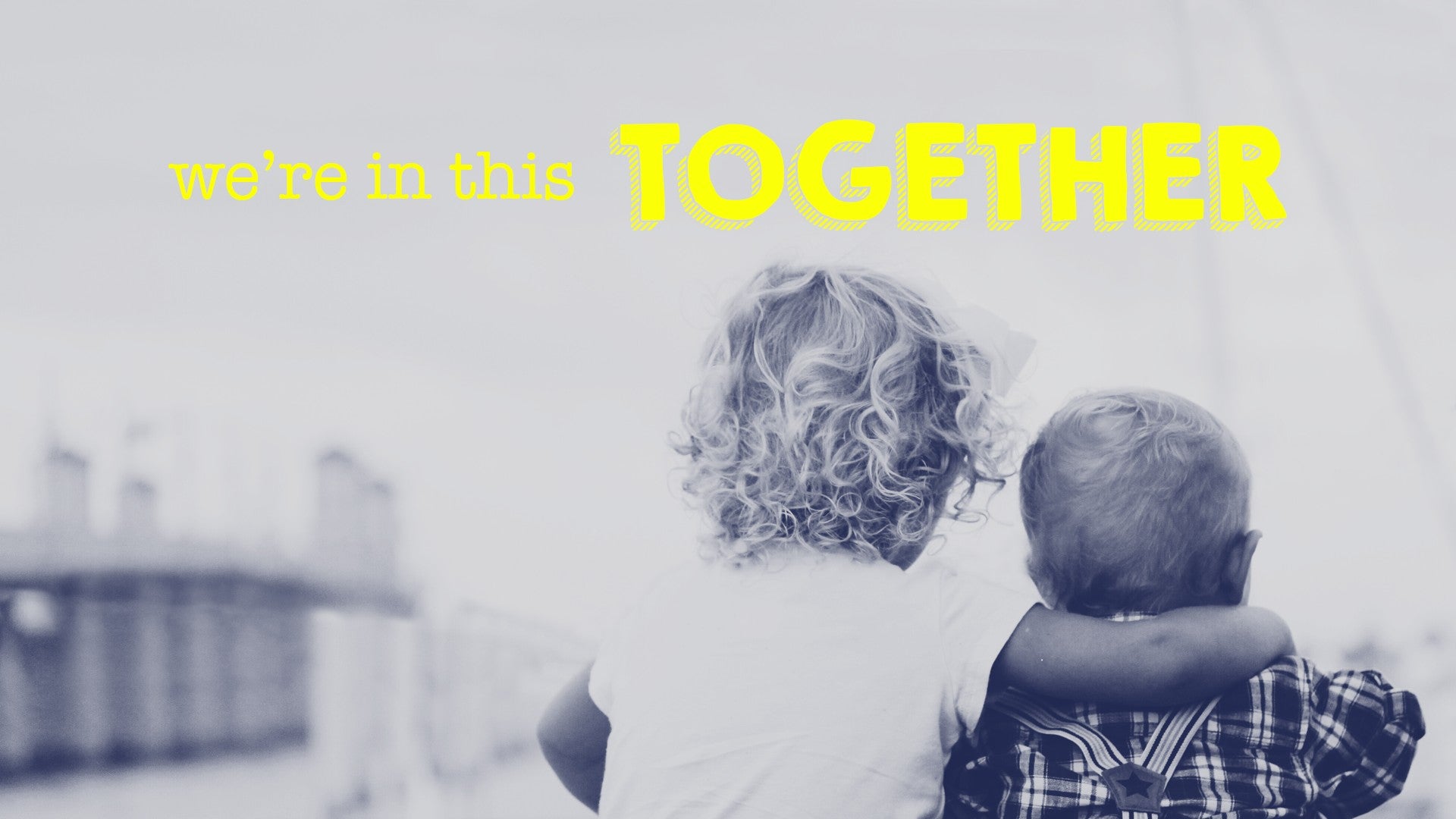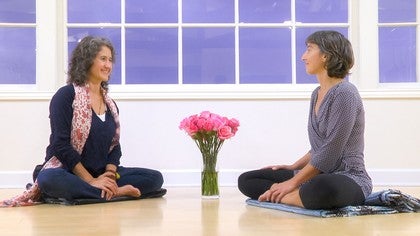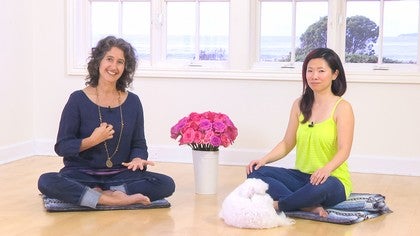Description
About This Video
Transcript
Read Full Transcript
Welcome, thank you for being here, and thank you dear Sonia for being here. It's really just been such a joy to watch you share from so deep within. I just love the exquisite sensuality you invite, this invitation. So Sonia and I met almost a year ago, December 2000, I guess it would be 2013, in Ojai. Sonia's from Spain.
And right away we began a conversation about the difficulty of translation of these teachings across different cultures and within different societies, and the different barriers that we might have in our heart. You know, there are so many human experiments going on on the planet, and we're all involved in at least a few. And so what I'd like to do is just sort of pick that conversation back up and invite you into it, and then we'll see where we go. So I remember when we first met and we were talking about the teachings, and one of your primary questions, our concerns was that when you went back to Spain to share some of what we were exploring in Ojai, that you weren't going to be able to use the word love as freely as we do in California. And I would love for you to share some of that thinking, some of the initial thoughts maybe, and then also maybe found out that you can, since we haven't really talked about that since we last spoke.
Yeah, it's true, and I remember when we were working in this workshop, which I think it was primal longings of the heart, so we were talking about love a lot, and I realized if I'm trying to teach this and work around the concept of love, and in my lessons, when I'm teaching at home, probably it will feel really awkward for me to use the word love all the time, because we don't really use it that much, which doesn't mean that we don't love each other, it's just that for us to say this word, to use this word, it means like we really know that we love this other person. And I guess that when we are involved in the yoga experience, one of the things that we are learning is that actually this energy that we are talking about all the time, it's love actually. But somehow, because it's not in our cultural background, we have some difficulties using it. And maybe after a year now I'm more free using this word, and it's true that I get to a point where I feel more compelled to use it and less awkward when I'm using it. But still, also because most of the students I have, because I'm teaching in a really small place, so most of the students I have, it's people who are not in the spiritual path or in the new age path and probably they are not reading any of the readings that we are reading or spiritual books.
So they are not really into this notion of love is everything there is that we might share. And if I want to get to the hearts of the people that I'm working with, I have to find a way to communicate with them that it's understandable for them. So maybe it's a thing of culture, but maybe it's also where am I teaching and where is the people that I'm teaching. And I always try to find the words that will encourage the people to go where I want them to go. So I want them to explore a little bit deeper and I have to find the right words.
And if I say the wrong words, maybe what I will get is the wrong outcome of it. Maybe they will feel like, oh, that sounds too strange. This woman is telling me that she loves me and it's the first day that she just, the first day I'm coming here to this lesson and she's already telling me that she loves me, something is wrong with her. So yeah, I'm just learning how to use this word also and bring it, I'm trying to bring the word in into my own space and culture and background because I think it's really interesting that we can talk about love. It's something we were exploring when our Sanskrit teacher Anuradha was here.
And one of the things we were talking about is how we devalue words. We take their meaning out of them when we overuse them or don't really let them have their impact. And one of the things that we've discovered around here too is because we are, well, perhaps we're meaning love in this big general spiritual way. What we are discovering is when we really do feel very deeply for somebody, we don't have a word, like we've taken away the word. By using it too much, there's no word left.
So I've been thinking about you and this conversation that we had so many months ago when we were talking about this with Anuradha. Our language completely determines our whole framework for everything we see because as soon as we're trying to put it in the context of the mind, we have to put it through the filter of language. So how we speak and what we say determines how we're thinking. And one of the things I love that you pointed out about the English language particularly was how friendly it is and how you spoke about how it inherently is interested in communication occurring and that friendliness seemed to translate also in the way that particularly we are in America, which also sort of touches on this subject of we're so friendly but maybe to a point. English is such an open language.
So you can really invent words and after a few months they will be in the dictionary. So this is something that is really happening. It's really a live language. So you keep on giving new meanings to words. Towards my language because we live inside of another country, it's kind of we feel that we have to protect the language because there is a lot of cross-contamination between Catalan and Spanish.
And so it's even less open to new words and new ways of using the language. So one of the things that it feels really fresh for me when I'm here is that I always find a way to say things even if I'm inventing a new word and everyone will understand me. And this simplicity first of the language of English and then this allowing for people to be creative with it, I think that are two of the things that make this language really accessible to people all over the world. And it's true that I find that this is a really friendly language because it helps you to feel comfortable with it the same I feel when I'm here. And I don't know if it's everywhere in America, at least in the West Coast I can say it's amazing, it's so easy to travel around here.
You don't have to make any effort and you meet people because they just feel compelled to come and talk to you. So you don't have to make an effort. Even if you're a shy person, you will end up meeting people. Mindfulness, awareness and consciousness. These three words, it's like at the beginning I couldn't understand what is the difference between mindfulness and awareness and consciousness and every author uses them in a different way and there is no direct translation for them in my own language.
We would say consciousness for everything. And then I can say be attentive to or pay attention to and maybe that would relate more with awareness sometimes or mindfulness sometimes. So I kind of had to find a way to give a meaning to these words from what I was reading and getting from the people that I was having conversations in English so I could feel them with meaning when I was teaching in my own language. And this is really interesting because while I'm doing this, I'm reflecting on these words which means that I'm reflecting on this path and how to work in this path. So this process of translating is helping me to understand things because I have to make an effort.
And I think that that's the same when we are reading words in Sanskrit. We read the sutras and then we read three, four translations of the sutras and all of them are completely different. And at the end is why it's ringing a bell on me, you know? If I read the translation and it's not resonating on me at all, it means that I'm not understanding it. And someone puts it in a different way and I kind of understand it.
It means that probably our cultural background is closer, so we are kind of closer, and he's kind of building a bridge for me to understand things. The other important thing with the translations, I guess, is if I believe what someone is saying, that's not working because that's not the truth, you know? That's just an interpretation of the truth. So I have to understand that I'm not being in connection with the source which is not written. I'm just reading something that someone is trying, but someone who has been in touch with the source is trying to bring to me.
I want to pull on this thread just a little bit more because so much of your teaching, so much of your call to us is to step out of our comfort zone. And so something that our teacher Ravi has taken from his teacher, Madame de Salzman, is when we speak of the word understanding, sometimes what we mean is overstanding. That when we perceive that we're trying to understand something, it's like, I got it, I can hold it, I can control it, you know? As opposed to stand under something and not necessarily totally get it, but be moved by it. So one of the things I find is that oftentimes when a translation, there are two layers where a translation will resonate with me, sometimes it's because it makes sense with what I already know to be true, and then there's something different.
There's something that draws me forward or deeper, and we can use words like forward, deeper, higher for the same thing, but draws me towards something that I don't understand. How do you know physiologically in this play of translation, because you use the word truth, and you know truth has very little to do with the words, and you spoke on being in touch with the source from where these teachings come. So can you just share with us how you physiologically know when you're hearing truth that's deeper than maybe what you already know? So I can read and read and read a lot of things, but at the end, for me, what it works is that I can only trust what I'm really feeling into my body, and it feels like, okay, I have deeply integrated something. So we can talk about things a lot, and that helps me to think about them, reflect on them, and then there is one day when it feels in my body like this is integrated, and it happens in a second, like suddenly I know that something is just like this.
But then the amazing thing is that even if I know right now that this is the truth, tomorrow or in a day or in a week or in a year, I can have another realization that will tell me, oh, that's not the truth anymore, there is something else, and that kind of contradicts what you thought it was the truth. I'd say the truth happens when you're really open for this to happen, and because openness has layers like everything else, the more you learn how to open to what it is, the deeper are the understandings and the teachings that you're receiving or achieving. So you know, something we've been talking about, and you've been talking about this play of all the different ways there are to be a human being, and how each and every place has something really new and magical about it, but that also has a shadow side, and something that we've been talking about, particularly about here in Southern California, there's an immense freedom here, there's an immense freedom, and even the suggestion that you can be anybody and anything, which brings an incredible, amazing sense of I can do it, which is unusual to older cultures, places that have been around for a lot longer. Simultaneously, it seems that what we'll use the word the shadow side of that is that also, because there's this incredible sense of freedom and independence, right next to that is an incredible sense of isolation, loneliness, and separation, and ungroundedness. And so what I'm interested in is just, since you come from somewhere else and you come here specifically for some of this medicine, if you could just help us understand that blend a little bit from your perspective.
Last year when I was here, I felt so inspired, and I felt so inspired that I decided to do my first retreat. And I went back home, I did the retreat, and then a lot of things happening, my normal life was kind of happening, and I felt myself like shrinking. So this year I needed to go out again, so I wanted to come here, because I have friends, because I can learn with you and practice with you, and that inspires me a lot. And because the culture here, it's kind of helping you to really spread your wings. I've just done one sequence of spreading the wings, because it is a real need for me.
There is this longing of, I want to be out there, and I want to spread my wings, and I want to do it, and when I'm home, I don't know how to do it. And the paradox in my life for me, it's like I want to go back home, because I really like it there, and there I feel rooted and grounded. And there is a part of me that feels so happy when I have this, that likes it so much, that feels so that's the right place. But then there is another part of me that feels like this is not the right place, this is such wrong place, you should be in a place where you can really spread your wings. So what I'm trying to do when I'm traveling and when I'm coming here is get as much as I can, so gather strength and courage to all the things I'm learning here, to have the courage to bring them back home and do them there in an environment that is not so open to this, and it doesn't make it that easy for me to do this.
You know, as we've been talking about, no one place has the answer, and really the genius of being able to be so connected so easily is that we get to learn and share and grow and discover all of these perspectives. I mean, one of the real hopes of Yoga Anytime is, how can we really allow this amazing technology to assist in this group learning, in this translation, in creating this global Sangha, how you imagine we could play and find new ways so that you maintain that sense of connection. What I live, because I have chosen to live in a rural area with small villages, and I feel kind of isolated when it comes to a Sangha. And we've been talking about, you know, I'm liking a Sangha, so I really love to come out here because the Sangha here is so nice. So I have amazing friends there, but we won't have this kind of conversations with them.
This is why I feel compelled to go out also, to find the Sangha. And there is something inside of me that is telling me that it's really nice that your Sangha is a Sangha with people from all over the world, because every culture has, as you put it before, a different way of understanding things because language is already giving you a frame that is like the frame that you use to understand the world. So when you're sharing with people from other cultures, they're giving you a completely new perspective that if you're on your own, you will never get. So you need this sharing with people who come from another place to kind of help you open up, and open up, and open up, and open up. So I would really like to have the opportunity to have this international Sangha.
And now that you're saying it, it's like I know that in my mind, and I have said it out loud at least three years ago, I would like to have an international Sangha, to belong to an international Sangha. From a practical point of view, for me, yoga anytime, because I'm not living in Southern California, I can have access to the videos, and I can see you all, and I can learn from you. But then, when do we have time together? So it would be possible maybe now that we can use Skype or whatever, it would be possible to decide, okay, we meet once a month. That day, we just sit all, whatever we are, and we talk, and we have an online communication group where we can share what have we been doing, what are the difficulties that we are encountering in our path, what are the last realizations that we have had.
We can really share from that place. That would help me a lot in these moments that I feel kind of isolated when it comes to the Sangha community. I think that that would be something really nice to think about. And then obviously, the online is not everything, so from time to time, we will need to see each other so we can touch each other and hug each other and feel the warmth really there. And I hope there will be more of this because I just love it.
So thank you very much.
We're in This Together
Comments
I speak French and the way to say and understand the world is define by the language at first. I know that when I think in English, I go deeper in me to find the right way, the right words to express what I really think, live, feel. I make an effort that I may not do in French.
When I realized that, I said to myself that I should do it in French as well. When I teach, I can use words and expressions that would not make any sense, but related to THE experience each and everyone is living in the practice of Yoga, it makes sense.
I also can say that there is only one place that I found to be exactly right all the time, no matter what, and this place is the Heart... the Sacred Heart... from there I can express what I think, live, feel, what I am longing to understand...
Physiologically, I feel a tingling sensation in my body and this sensation is Pure Joy !
Many thanks to share this conversation, I am already there in this Universal Sangha with you...
Namaste !
You need to be a subscriber to post a comment.
Please Log In or Create an Account to start your free trial.

















